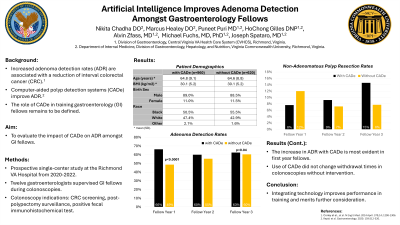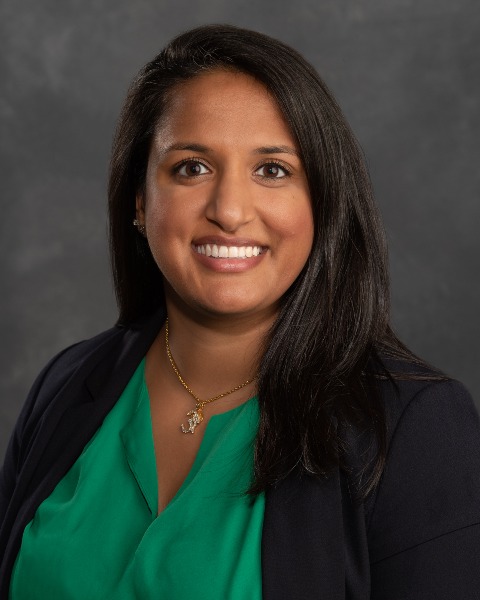Sunday Poster Session
Category: Colorectal Cancer Prevention
P0393 - Artificial Intelligence Improves Adenoma Detection Amongst Gastroenterology Fellows
Sunday, October 27, 2024
3:30 PM - 7:00 PM ET
Location: Exhibit Hall E

Has Audio

Nikita Chadha, DO
Virginia Commonwealth University Health System
Richmond, VA
Presenting Author(s)
Nikita Chadha, DO1, Marcus Healey, DO1, Puneet Puri, MD2, HoChong Gilles, NP2, Michael Fuchs, MD2, Joseph Spataro, MD2, Alvin Zfass, MD2
1Virginia Commonwealth University Health System, Richmond, VA; 2Hunter Holmes McGuire VA Medical Center, Richmond, VA
Introduction: Increased adenoma detection rates (ADR) are associated with a reduction of interval colorectal cancer (CRC). To improve ADR, the real-time computer-aided polyp detection (CADe) systems were validated. This study aims to evaluate the impact of applying a FDA approved CADe to evaluate the ADR in colonoscopy amongst supervised first through third year gastroenterology (GI) fellow trainees.
Methods: This single-center, IRB approved, prospective study was performed at a Veterans Affair Medical Center from 2020 to 2022. Twelve US board-certified faculty supervised GI fellow trainees during colonoscopy a year with and without implementation of a CADe. Inclusion criteria included Veterans undergoing high-definition white light colonoscopy for screening, post-polypectomy surveillance, or follow up screening after a positive fecal immunohistochemical test. Those with a history of CRC, inflammatory bowel disease, prior colon resection, on antithrombotic therapy which precludes polyp resection, inadequate bowel preparation, incomplete colonoscopy, or a withdrawal time of less than six minutes were excluded. Descriptive statistics were performed and a p value < 0.05 was significant.
Results: 1,020 patients were included (with CADe n=435, without CADe n=585). Compared to colonoscopy without, colonoscopy with CADe had higher polyp detection rate (74.3% vs. 62.6%; p< 0.0001) and adenoma detection rate (63.9% vs. 52.8%; p=0.0003). Withdrawal time was comparable in non-interventional colonoscopies (with CADe 12.31 minutes vs. without CADe 12.34 minutes). Additionally, non-neoplastic resection rates were similar (with CADe 10.3% vs. without CADe 9.7%). When stratified by fellowship year, under faculty supervision, there was a 20% increase in ADR amongst first year fellows while using CADe (with 68.6% vs. without 48.5%; p=0.0003). A majority of colonoscopies performed by first year fellows were supervised by faculty with more than 10 years of experience.
Discussion: Colonoscopy with CADe markedly improved ADR without compromising safety. These data demonstrate the value of incorporating technology in both fellowship training and long-term practice.
Disclosures:
Nikita Chadha, DO1, Marcus Healey, DO1, Puneet Puri, MD2, HoChong Gilles, NP2, Michael Fuchs, MD2, Joseph Spataro, MD2, Alvin Zfass, MD2. P0393 - Artificial Intelligence Improves Adenoma Detection Amongst Gastroenterology Fellows, ACG 2024 Annual Scientific Meeting Abstracts. Philadelphia, PA: American College of Gastroenterology.
1Virginia Commonwealth University Health System, Richmond, VA; 2Hunter Holmes McGuire VA Medical Center, Richmond, VA
Introduction: Increased adenoma detection rates (ADR) are associated with a reduction of interval colorectal cancer (CRC). To improve ADR, the real-time computer-aided polyp detection (CADe) systems were validated. This study aims to evaluate the impact of applying a FDA approved CADe to evaluate the ADR in colonoscopy amongst supervised first through third year gastroenterology (GI) fellow trainees.
Methods: This single-center, IRB approved, prospective study was performed at a Veterans Affair Medical Center from 2020 to 2022. Twelve US board-certified faculty supervised GI fellow trainees during colonoscopy a year with and without implementation of a CADe. Inclusion criteria included Veterans undergoing high-definition white light colonoscopy for screening, post-polypectomy surveillance, or follow up screening after a positive fecal immunohistochemical test. Those with a history of CRC, inflammatory bowel disease, prior colon resection, on antithrombotic therapy which precludes polyp resection, inadequate bowel preparation, incomplete colonoscopy, or a withdrawal time of less than six minutes were excluded. Descriptive statistics were performed and a p value < 0.05 was significant.
Results: 1,020 patients were included (with CADe n=435, without CADe n=585). Compared to colonoscopy without, colonoscopy with CADe had higher polyp detection rate (74.3% vs. 62.6%; p< 0.0001) and adenoma detection rate (63.9% vs. 52.8%; p=0.0003). Withdrawal time was comparable in non-interventional colonoscopies (with CADe 12.31 minutes vs. without CADe 12.34 minutes). Additionally, non-neoplastic resection rates were similar (with CADe 10.3% vs. without CADe 9.7%). When stratified by fellowship year, under faculty supervision, there was a 20% increase in ADR amongst first year fellows while using CADe (with 68.6% vs. without 48.5%; p=0.0003). A majority of colonoscopies performed by first year fellows were supervised by faculty with more than 10 years of experience.
Discussion: Colonoscopy with CADe markedly improved ADR without compromising safety. These data demonstrate the value of incorporating technology in both fellowship training and long-term practice.
Disclosures:
Nikita Chadha indicated no relevant financial relationships.
Marcus Healey indicated no relevant financial relationships.
Puneet Puri indicated no relevant financial relationships.
HoChong Gilles indicated no relevant financial relationships.
Michael Fuchs indicated no relevant financial relationships.
Joseph Spataro indicated no relevant financial relationships.
Alvin Zfass indicated no relevant financial relationships.
Nikita Chadha, DO1, Marcus Healey, DO1, Puneet Puri, MD2, HoChong Gilles, NP2, Michael Fuchs, MD2, Joseph Spataro, MD2, Alvin Zfass, MD2. P0393 - Artificial Intelligence Improves Adenoma Detection Amongst Gastroenterology Fellows, ACG 2024 Annual Scientific Meeting Abstracts. Philadelphia, PA: American College of Gastroenterology.

